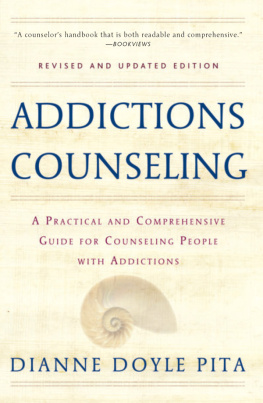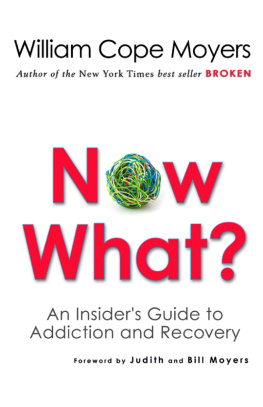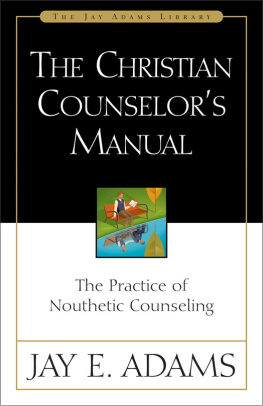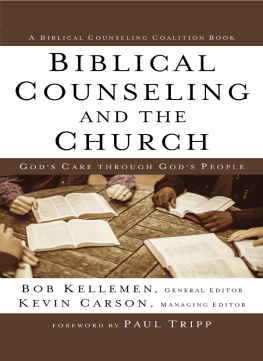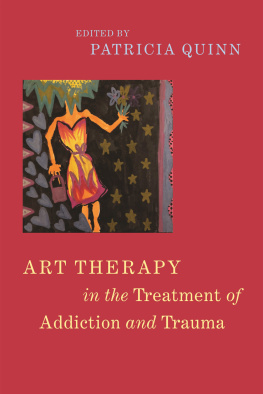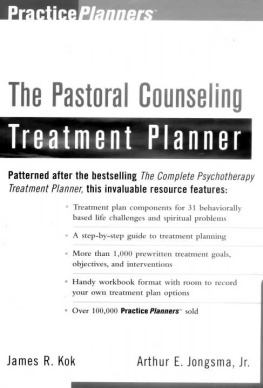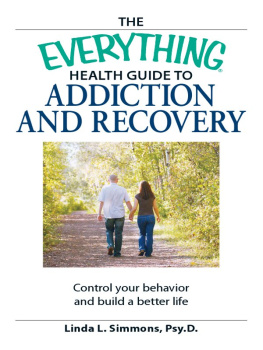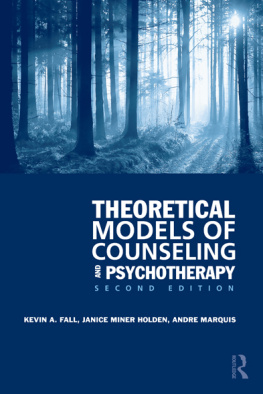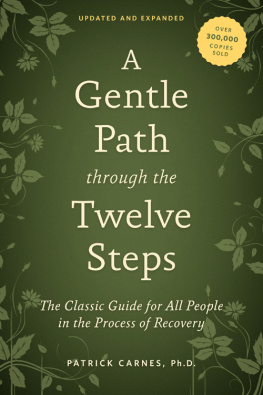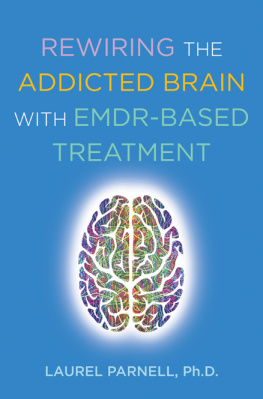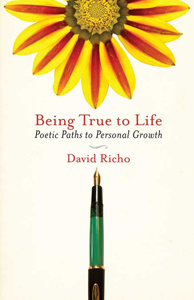Praise for the first edition of
Addictions Counseling:
Dr. Pita crams an amazing amount of information to produce a counselors handbook that is both readable and comprehensive. Significantly, the recovery methods of AA and rational emotive therapy are shown to be complementary, an approach the author has used successfully in her own practice. This book is another worthy addition to Crossroads superb counseling series. Recommended. Bookviews
A fresh and greatly needed approach to helping the whole person; it fills a great gap in the existing literature.
Thomas Perrin, author of I Am an Adult
Who Grew Up in an Alcoholic Family
A valuable addition to the field. Perspectives on Addictions Nursing
Valuable. Would serve as a good academic text for chemical dependency counseling programs as well as being a nice addition to any counselors personal library. It deserves a high rating.
Journal of Psychoactive Drugs
Counselors just beginning their careers or those who often must do the work of counseling such as ministers, teachers, and nurses will greatly appreciate the value of this book as an introduction to the field. Experienced therapists will value the creative insights of the author and her skilled blending of approaches that many have considered antagonistic, such as the two views proposed by Alcoholics Anonymous and cognitive therapy. It is a wise, flexible, and openminded guide that pulls together the contemporary knowledge about substance abuse into one source. Dr. William van Ornum
The Crossroad Publishing Company
www.CrossroadPublishing.com
Copyright 1992, 2004 by Dianne Doyle Pita
All rights reserved. No part of this book may be reproduced, stored in a retrieval system, or transmitted, in any form or by any means, electronic, mechanical, photocopying, recording, or otherwise, without the written permission of The Crossroad Publishing Company.
Printed in the United States of America
The text is set in 10/13 Garamond Antiqua.
Library of Congress Cataloging-in-Publication Data
Pita, Dianne Doyle.
Addictions counseling : a practical and comprehensive guide to counseling people with addictions / Dianne Doyle Pita. Rev. and updated.
p. ; cm.
Includes bibliographical references.
ISBN 9780824527167
1. Substance abuse Patients Counseling of. 2. Substance abuse Patients Rehabilitation. 3. Substance abuse Treatment.
[DNLM: 1. Substance-Related Disorders therapy. 2. Counseling methods.
WM 270 P681a 2004] I. Title.
RC564.P58 2004
616.86_06 dc22
2004002424
Contents
ACKNOWLEDGMENTS
I dedicate this book to all those people with addictions trying to defeat the enemy of addiction and all those counselors on the front line fighting alongside of them. To all those still out there losing the battle, I hope that we can find a way to reach you, soon. To the millions who have passed on having lost the battle with addictions, addictions that robbed them of their will to see the beauty of reality and convinced them that living a life sober is not living at all, I hope that we have learned from them and that knowledge is used to better help others live a life free of the haze of addiction.
INTRODUCTION
Twelve years have passed since my writing of the first edition of Addictions Counseling. Since then I have taught and supervised hundreds of students and treated many patients. My enthusiasm has not dwindled over the years; if anything I am more committed to helping people recover. There have been developments but no revolutions in the field; we are plugging along using tried-and-true techniques. The field is becoming more professional as more people seek credentials for addictions counseling. There are more counselors and psychotherapists entering the field who are not in recovery. The need to be treated by someone suffering from the same illness as oneself is now more often seen as a symptom of the disease than anything else. Are we making progress as a society in decreasing the use and abuse of substances? Anecdotal evidence and statistics do not suggest we have won the war against drugs, but we appear to be making some headway. I think more than ever kids are searching for something to fill the void in their lives, and this leads them to use drugs. We have younger and more emotionally disturbed substance abusers to start with, but we may be improving in positive treatment outcomes. We clearly need to focus efforts on prevention and intervention, and I think that lies in family work.
My life continues to be affected by the disease of addiction, with loved ones passing on and others giving up the fight. This has renewed my commitment to trying to find something that works better. Is there anything new that will help us increase our effectiveness as addictions counselors? Yes, that is what motivated me to write this newly revised and updated edition. In the first edition I presented an integrated approach to addictions counseling, integrating cognitive-behavioral and Twelve Step approaches. I have since discovered the terrific technique of motivational interviewing, developed by Miller and Rollnick. Now I present an integration of cognitive-behavioral and Twelve Step approaches with the motivational approach added. If you can learn and utilize this approach you will increase the effectiveness of your counseling, and you will experience less professional burnout.
A second change in the field is increased recognition of the problem of drugs other than alcohol. I am getting more and more patients with addiction to drugs such as cocaine, marijuana, and heroin. The National Institute of Drug Abuse (NIDA) has given priority to addiction to drugs other than alcohol. In particular, cocaine is a drug of focus today, though heroin is equally a problem. Addiction is considered a brain disease and as such this has opened the way for treatment through medications. There are medications to reduce cravings and medications being developed to reduce damage already done by drug use. I have updated many sections by including the most current research.
A third change is the increased awareness of co-occurring substance dependence and psychiatric disorders. We can expect 3050 percent of those being treated for substance abuse to also have a psychiatric diagnosis such as depressive or bipolar disorder. I have included information on dual disorders that will provide guidance on how to best treat people with psychiatric disorder who also have a substance abuse problem. Related to both prescription medication (for addiction and for psychiatric disorders) and increasing secondary diagnoses is the ever-rising problem of prescription drug abuse. We are witnessing an increasing use of psychiatric diagnosis and consequent increase in availability of prescription drugs. The negative consequence is a rise in abuse of prescription drugs and the illicit sale of such drugs. In particular, many women I see are routinely prescribed addictive psychiatric medications, and many adolescents are getting drugs from classmates who are selling or abusing their own drugs. Abuse of pain medications is rampant among adults, as is abuse of the overly prescribed medication for attention deficit/ hyperactivity disorder (ADHD), particularly popular among adolescents. Women and children are especially vulnerable to prescription drug abuse, and I have included some specific information unique to these two populations.
Some material remains essentially the same, for instance, the discussion of stages of recovery. What else hasnt changed? While awareness of addiction has increased, I do not think we have made significant progress in our attitude toward those with addictions. Some of those in the medical field still lag, at least in my area of the country. There are instances of patients being treated more as criminals needing punishment than as patients with a disease. Being in recovery does not automatically make counselors or others in the helping professions empathic or compassionate. Program managers and counselors who are themselves in recovery are often the least aware of their own transference issues and the most punishing of all helpers. There continue to be far too many instances of treatment programs hiring patients straight out of treatment, too many instances of counselors getting high on the job and not being confronted or being confronted and allowed to return after only a few days to get their act together. Prejudice toward persons with addictions is like any other prejudice; the anger and disrespect shown toward people with addictions has to do with a lack of education and lack of insight into ones own unresolved issues. The good news is that progress toward professionalism, though slow, is happening. Hope for improved treatment lies in addictions counselors who have empathy, ethics, insight, and motivation.

